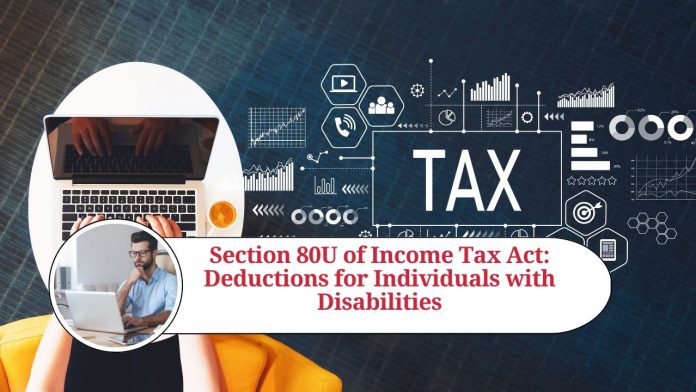The Indian Income Tax Act provides various tax deductions and exemptions to individuals with disabilities under Section 80U. This section allows for a tax deduction of up to Rs. 1.25 lakh to persons with disabilities. The Section provides relief to taxpayers with disabilities by reducing their tax liability. This blog will discuss Section 80U of the Income Tax Act, AY 2018-19.
Eligibility Criteria for Section 80U
To claim the deduction under Section 80U, the individual must be certified by a medical authority. The certificate should state that the individual has a disability of 40% or more. Disabilities that are covered under this section include blindness, low vision, hearing impairment, locomotor disability, mental retardation, mental illness, and multiple disabilities.
Amount of Deduction
The deduction allowed under Section 80U is up to Rs. 1.25 lakh for individuals with disabilities. The amount of deduction depends on the extent of the disability. If the disability is below 80%, the deduction allowed is Rs. 75,000. If the disability is 80% or more, the deduction allowed is Rs. 1.25 lakh.
Conditions for Claiming Deduction
To claim the deduction under Section 80U, the taxpayer must meet certain conditions:
- The individual should be a resident of India for the relevant financial year.
- The individual should have a disability of 40% or more.
- The individual must have a valid certificate issued by a medical authority.
- The individual must not have claimed any deduction under Section 80DD during the same financial year.
Additional Details on Section 80U
Section 80U of the Income Tax Act is a provision that is specifically designed to provide tax relief to individuals with disabilities. The section allows for a deduction of up to Rs. 1.25 lakh for individuals with disabilities, which can significantly reduce their tax liability.
Types of Disabilities Covered Under Section 80U
Section 80U covers various types of disabilities, including blindness, low vision, hearing impairment, locomotor disability, mental retardation, mental illness, and multiple disabilities. The extent of the disability is determined by a medical authority, which issues a certificate specifying the disability’s severity.
Criteria for Medical Certification
To claim the deduction under Section 80U, the individual must have a valid certificate issued by a medical authority. The certificate should state that the individual has a disability of 40% or more. The certificate should be issued by a medical authority defined in Rule 11A of the Income Tax Rules, 1962. The medical authority should be a specialist in the field related to the disability.
Conditions for Claiming Deduction
To claim the deduction under Section 80U, the individual must fulfill certain conditions. Firstly, the individual should be a resident of India for the relevant financial year. Secondly, the individual should have a disability of 40% or more. Thirdly, the individual must have a valid certificate issued by a medical authority. Fourthly, the individual must not have claimed any deduction under Section 80DD during the same financial year.
Deduction Limit for Individuals with Disabilities
The deduction limit under Section 80U depends on the extent of the disability. If the disability is below 80%, the deduction allowed is Rs. 75,000. If the disability is 80% or more, the deduction allowed is Rs. 1.25 lakh. This deduction is in addition to the deduction allowed under Section 80C of the Income Tax Act.
Conclusion
Section 80U of the Income Tax Act provides relief to taxpayers with disabilities by reducing their tax liability. The deduction allowed depends on the extent of the disability and can be up to Rs. 1.25 lakh. To claim the deduction, the individual must meet certain conditions, including having a valid certificate issued by a medical authority. This provision is a small but important step towards ensuring that individuals with disabilities have equal access to opportunities and benefits.
Read more useful content:
- section 145 of income tax act
- section 10e of income tax act
- section 9 of the income tax act
- section 94b of income tax act
- section 206aa of income tax act
Frequently Asked Questions (FAQs)
Who is eligible to claim a deduction under Section 80U of the Income Tax Act?
Individuals who have a disability of 40% or more, and have a valid certificate issued by a medical authority, are eligible to claim a deduction under Section 80U.
What types of disabilities are covered under Section 80U?
Section 80U covers various types of disabilities, including blindness, low vision, hearing impairment, locomotor disability, mental retardation, mental illness, and multiple disabilities.
What is the maximum deduction allowed under Section 80U?
The maximum deduction allowed under Section 80U is Rs. 1.25 lakh for individuals with disabilities.
What is the criteria for medical certification under Section 80U?
The certificate should be issued by a medical authority defined in Rule 11A of the Income Tax Rules, 1962. The medical authority should be a specialist in the field related to the disability.
What is the deduction limit for individuals with disabilities below 80% under Section 80U?
The deduction allowed is Rs. 75,000 for individuals with disabilities below 80%.
Can an individual claim deductions under both Section 80U and Section 80DD?
No, an individual cannot claim deductions under both Section 80U and Section 80DD during the same financial year.
Is there any age limit to claim deductions under Section 80U?
No, there is no age limit to claim deductions under Section 80U.
Can an individual claim deductions under Section 80U for multiple disabilities?
Yes, an individual with multiple disabilities can claim deductions under Section 80U.
Can a non-resident claim deductions under Section 80U?
No, only resident individuals are eligible to claim deductions under Section 80U.
What is the purpose of Section 80U of the Income Tax Act?
The purpose of Section 80U is to provide tax relief to individuals with disabilities, to encourage their participation in the workforce, and to ensure equal access to opportunities and benefits.




















